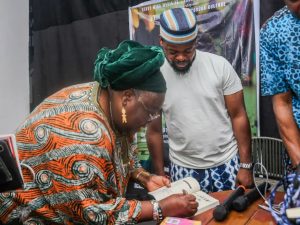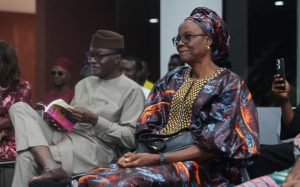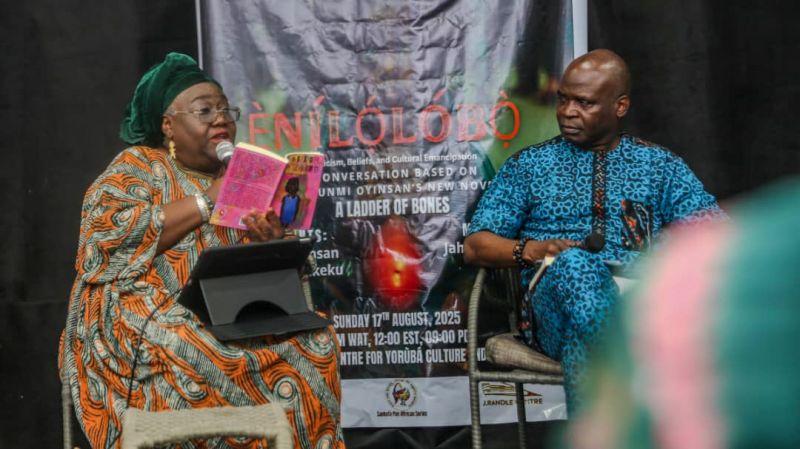Writer, scholar and filmmaker, Bunmi Oyinsan, speaks on the making and essence of her new novel, A Ladder of Bones, at a session held in Lagos, AKEEM LASISI writes
After a woman has carried a pregnancy for nine months, the relief she feels upon safe delivery is always phenomenal. Then, one can only imagine how she would feel if she has to carry the pregnancy for 10 years — God forbid! Canada-based Nigerian writer and scholar, Bunmi Oyinsan, is perhaps the person that can best tell the story. She has just released a new novel titled A Ladder of Bones, which took her 10 long years to write.
It was one of the revelations she made in Lagos on Sunday August 17, 2025 when she presented the new offering to the literary community at a reading and conversation event held at the JK Randle Centre for Yoruba Culture and History. Comparing A Ladder of Bones to her earlier works that include The Fabulous Four, she said, “The only unique thing about this book is that it took me 10 years to write it. It was just a story I must write with all dedication. I told myself I must do it even if I wasn’t going to write any other one after it.”
A novel that travels across continents, A Ladder of Bones is described as a powerful novel about five young Africans grappling with personal histories and the legacy of violence. As legendary Chinua Achebe’s Things Fall Apart seeks to smash the racial myth celebrated in Joseph Conrad’s Heart of Darkness, Oyinsan, in the new work, counters the glorification of colonisation in Ellen Thorp’s largely same-title Ladder of Bones. According to her, it is a fallacy to say that the intention behind the British Empire and other European empires was noble or altruistic. The colonialists did not do Africa a favour, she insisted.
She said during the conversation directed by the Committee for the Relevant Arts co-founder, Jahman Anikulapo, “In her (Thorp’s) version, she presents British colonisation in Nigeria as noble and altruistic. A lot of us know that is nowhere near the truth. Of course, unless you are telling Badenoch. (Laughter rocks the hall…) So, she presents colonisation as altruistic and the efforts of the missionaries and administrators as civilising the land said to be devastated by tribal warfare, slave trading and other issues. Her position draws on the popular trope that the British Empire and other European empires did the fantastic work to get Africa developed. But beneath that paternalistic language and this so-called righteous intention lies the real history of brutal conquests that we were never taught in school, of cultural erasure and inter-generational trauma we are still grappling with. So, my novel deliberately plays on Ellen Thorp’s title where ‘Ladder of Bones’ symbolises the sacrifices of the colonial agents. I reclaim it. I jam it to highlight the human cost of colonisation.”

Oyinsan read excerpts from the book during the conversation that also featured celebrated dancer, Qudus Onikeku. In the course of the programme, A Ladder of Bones got pollinated with ‘Re-Incarnation’, a recent dance by Onikeku, which also dwells on the self-rediscovery the novel espouses. According to Onikeku, it is built on walking around cyclical times of birth, death and rebirth in a continuous way “because we don’t believe in the lineal occurrence of life after death.”
On the travelogue spirit of A Ladder of Bones, Oyinsan noted, “The novel travels across Africa, the Caribbean, North America. And what I try to do is to explore the elements of colonisation across generations and continents. In many ways, this novel is a direct reaction to the so-called colonial history we have long been fed with,”
On the prominence of character Enilolobo in the story, Oyinsan stated that it was not an emblem of gender identity or ideology. She explained, “I don’t know why. Seriously. But, actually, Enilolobo was the first inspiration. I mean, when I decided to talk back, to counter, you know, through the stories of human beings, history, Enilolobo was the first character that suggested herself to me. You know, which is why she’s the one who anchors the entire story. One of our recent methodologies is to avoid binary opposition. So, I would never write a book that is all one-sided.”
Oyinsan further noted that A Ladder of Bones was also not out to overprotect Africa or pamper the ancestors. “ Even with the Enilolobo story, she is seen as being captured, you know, from a village in Africa as a child. And who led the people to come and capture her? The baale’s (village head son. So, that complicity, we have to face it. And I’m a believer that psychically we hurt ourselves in such a way that until we face that wound, we cannot move forward. So, we must make amends. We must admit, just as we’re condemning, we must admit where we went wrong.
“We are surprised that we have politicians who are corrupt. As if that is new. Go back to our history. We had rulers, we had fantastic systems of government, but we had horrible people too. So, if we know all of that, we would probably be better prepared to choose whom we want to trust with our votes. So, when I say go back to history, I do not mean to glorify it. It would be stupid of us to glorify everything about us. But we cannot be complicit or accept that everything about us was rubbish. Or that we had no contributions to development.”

While many other stakeholder like Professor Kole Ade-Odutola and Dr Lookman Sanusi virtually participated, at the event where this writer (Akeem Lasisi) also performed some reincarnating atunda poems, were Oyinsan’s fellow creative missioners such as star actress Joke Silva, The NEWS Publisher, Kunle Ajibade with his wife, Olubunmi; a former Chairman of the Association of Nigerian Authors, Lagos State branch, Kayode Aderinokun; and Perpetual Eziefule, who read the review of A Ladder of Bones, on behalf of scholar and writer, Jumoke Verissimo, who is also based in Canada. Of course, the author’s filmmaker husband, Soji Oyinsan, was also there for her.



